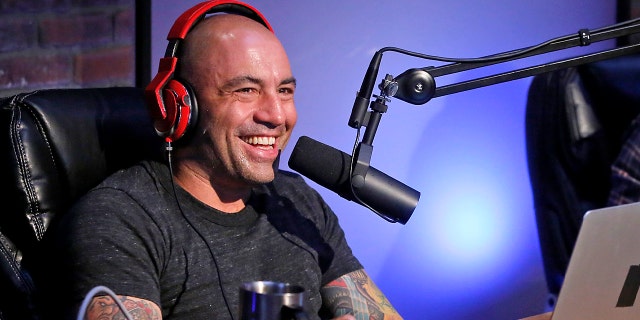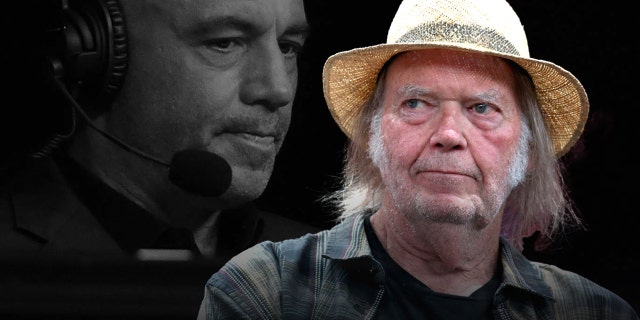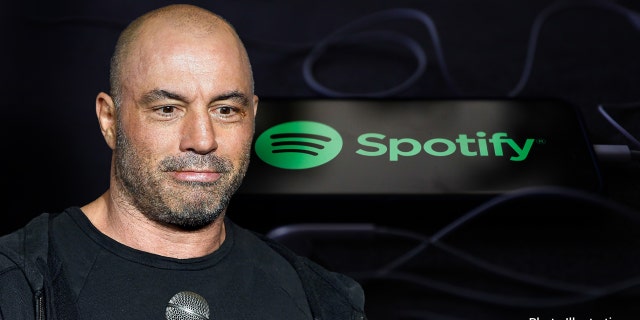Joe Rogan blinked.
Or he did the digital-age equivalent: he made an Instagram video.
And he said his critics–most notably one aging rocker–have a point. And promised to do better.
So Neil Young, excuse the expression, struck a chord.
I say that as a huge Crosby, Stills, Nash & Young fan who thinks the musician went way too far in trying to intimidate Spotify into censoring one of its most popular voices. And there is a giant lesson here for one of the world’s biggest streaming services.

JOE ROGAN QUESTIONS EVERYTHING — “Podcast” — Pictured: (l-r) Joe Rogan, Duncan Trussell —
(Photo by: Vivian Zink/Syfy/NBCU Photo Bank/NBCUniversal via Getty Images)
Now I believe what Young did in threatening to remove his songs from Spotify if the company didn’t dump Rogan was something between a shakedown and a publicity stunt. He’s free to criticize Rogan or write a mocking song about him, but on what planet would Spotify fire America’s most popular podcaster because a songwriter who peaked in the ’70s doesn’t like his views?
Still, I have to admit, it worked. Once Spotify pulled the plug on Young, other musicians–from fellow Canadian Joni Mitchell to Springsteen guitarist Nils Lofgren–jumped on the Young bandwagon. Even Harry and Meghan, who are getting $30 million of Spotify’s money and have so far produced zero podcasts, issued a statement of support.
Young has always been political–since the days of “tin soldiers and Nixon coming”–and now the 76-year-old performer was occupying the center of a global debate. He was saying that “Rocking in the Free World” doesn’t apply to everyone if they peddle falsehoods.

(Jasen Vinlove-USA TODAY Sports | Photo by Gary Miller/Getty Images)
Rogan’s response to his listeners: “If I pissed you off, I’m sorry … Do I get things wrong? Absolutely.”
And his response to Neil and Joni: “I’m very sorry that they feel that way. I most certainly don’t want that. I’m a Neil Young fan. I’ve always been a Neil Young fan.”
Rogan’s problems have to do with Covid and vaccines. He’s never held himself out as a medical expert. Last year, after saying healthy young people didn’t need to get vaccinated, he took it back and called himself a “f***ing moron.”
But he became increasingly controversial as he hosted vaccine skeptics, including one who compared mandates to Nazi Germany and spoke of mass hypnosis.
Rogan, who takes in an estimated $100 million from Spotify, pushed back against the “misinformation” label, saying in the video that he hosts “highly credentialed, very intelligent, very accomplished” guests. “They have an opinion that is different from the mainstream narrative.”

Democrats have called for Joe Rogan to be silenced by Spotify.
(Photo by Michael S. Schwartz/Getty Images | getty)
At the same time, Rogan said he sometimes does little research for the show and pledged to “have all the pertinent facts at hand before I discuss them.” He also promised to “balance out these more controversial viewpoints with other people’s perspectives so we can maybe find a better point of view.”
What listeners love about Rogan is his funny, defiant, Everyman approach to popping off on all kinds of things for three hours a day. But this is a significant retreat for him, a belated recognition that his words matter beyond mere entertainment, especially on a life-and-death subject.
It’s even more of a reckoning for Spotify. When it was just a platform for tens of millions of songs, the company just had to make sure the artists didn’t feel ripped off.
But like Facebook, Twitter and YouTube, once Spotify moved into the realm of podcasts and politics, it was no longer all fun and games. Critics wanted to know whether it was willing to police hate speech and disinformation. So the company had to grow up in a hurry.
Spotify, which relies heavily on subscriptions, said Sunday that all podcasts involving the coronavirus would carry a content advisory directing people to a “hub” page of information provided by the likes of CNN, ABC, BBC and Politico. It’s not clear whether that would be mentioned on the podcasts themselves or just in the listings.
SUBSCRIBE TO HOWIE’S MEDIA BUZZMETER PODCAST, A RIFF ON THE DAY’S HOTTEST STORIES
Spotify also made public its rules for podcasters–something it should have done long ago–banning “false or dangerous deceptive medical information that may cause offline harm or poses a direct threat to public health.”
While the enforcement mechanisms aren’t clear, Spotify is now admitting it’s a full-fledged media company. And it acted only after the threat to its business model that the Neil Young crusade represented.
Rogan, by the way, said “there’s a lot of people that have a distorted perception of what I do, maybe based on sound bites or based on headlines of articles that are disparaging.” That’s true, and it’s also what has fueled his fame. If Rogan is coming to realize that fame brings certain responsibilities, he could be in better harmony with the media culture.